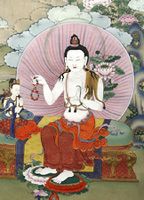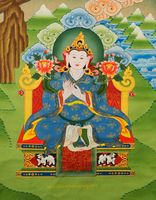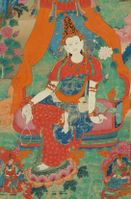Difference between revisions of "Kalkī Śrī Puṇḍarīka"
Jump to navigation
Jump to search
| Line 8: | Line 8: | ||
|HasLibPage=Yes | |HasLibPage=Yes | ||
|HasBnwPage=Yes | |HasBnwPage=Yes | ||
| + | |MainNameTib=པདྨ་དཀར་པོ་ | ||
| + | |MainNameWylie=pad+ma dkar po | ||
| + | |TitleTibetan=རིགས་ལྡན་ | ||
| + | |TitleWylie=rigs ldan | ||
|Ordinal=2 | |Ordinal=2 | ||
| + | |YearBirth=176 BCE | ||
| + | |YearDeath=76 BCE | ||
| + | |EmanationOf=Avalokiteśvara | ||
| + | |BdrcLink=https://www.tbrc.org/#!rid=P4CZ15082 | ||
| + | |BdrcPnum=4CZ15082 | ||
|BnwShortPersonBio=The mythical second king of Shambhala, who is reported to have written the ''Vimalaprabhā'', an important commentary on the ''Kālacakra Tantra''. He is considered to be an emanation of Avalokiteśvara and subsequently the Dalai Lamas are considered to be emanations of this king. | |BnwShortPersonBio=The mythical second king of Shambhala, who is reported to have written the ''Vimalaprabhā'', an important commentary on the ''Kālacakra Tantra''. He is considered to be an emanation of Avalokiteśvara and subsequently the Dalai Lamas are considered to be emanations of this king. | ||
|IsInGyatsa=No | |IsInGyatsa=No | ||
}} | }} | ||
Revision as of 12:30, 30 December 2019
Kalkī Śrī Puṇḍarīka on the DRL
པདྨ་དཀར་པོ་
| Wylie | pad+ma dkar po |
|---|
Dates
| Birth: | 176 BCE |
|---|---|
| Death: | 76 BCE |
Tibetan calendar dates
About
- Is emanation of
- Avalokiteśvara
Other Biographical info:
Links
- BDRC Link (P4CZ15082)
- https://www.tbrc.org/#!rid=P4CZ15082
- Wiki Pages
Buddha Nature Project
- Person description or short bio
- The mythical second king of Shambhala, who is reported to have written the Vimalaprabhā, an important commentary on the Kālacakra Tantra. He is considered to be an emanation of Avalokiteśvara and subsequently the Dalai Lamas are considered to be emanations of this king.
Expand to see this person's philosophical positions on Buddha-nature.
| Is Buddha-nature considered definitive or provisional? | |
|---|---|
| Position: | |
| Notes: | |
| All beings have Buddha-nature | |
| Position: | |
| If "Qualified", explain: | |
| Notes: | |
| Which Wheel Turning | |
| Position: | |
| Notes: | |
| Yogācāra vs Madhyamaka | |
| Position: | |
| Notes: | |
| Zhentong vs Rangtong | |
| Position: | |
| Notes: | |
| Promotes how many vehicles? | |
| Position: | |
| Notes: | |
| Analytic vs Meditative Tradition | |
| Position: | |
| Notes: | |
| What is Buddha-nature? | |
| Position: | |
| Notes: | |
| Svātantrika (རང་རྒྱུད་) vs Prāsaṅgika (ཐལ་འགྱུར་པ་) | |
| Position: | |
| Notes: | |
| Causal nature of the vajrapāda | |
| Position: | |


